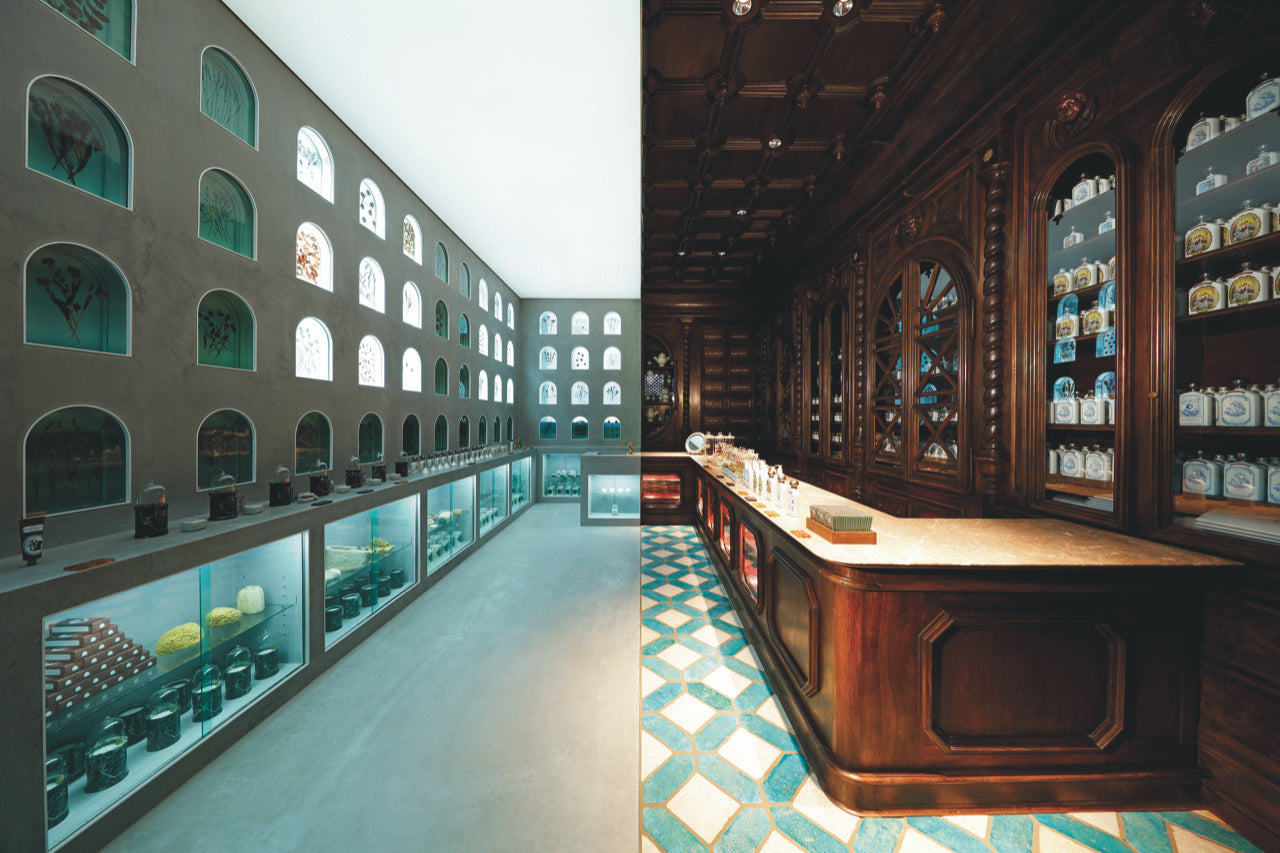
The Smell of Success when Bringing Back a Brand
What does it take to resurrect a bygone heritage brand into a renowned player in premium products?
Ramdane Touhami has crafted a legacy around his ability to be ahead of the curve, his name holds weight across fashion and art. The French-Moroccan artist, creative director, and entrepreneur is often labeled "a multi-disciplinary and polymath entrepreneur" by international publications. To many, he is the individual that revived Officine Universelle Buly, which has grown to become a true heavyweight in the beauty industry. What does it take to awake a 19th-century brand that fell behind with the times into a newfound source of inspiration to others? Touhami lays bare his story in the foreword of The Beauty of Time Travel.
Touhami: "In today’s world, it may well appear that stores are opened mainly for mercantile reasons, to satisfy a commercial desire. What’s more, people generally tend to view the neighborhood store as futile, if not obsolete, in this age of e-commerce, rather than consider the services and social interactions that they provide. And yet, opening a store in the 21st century remains essential. Slowly but surely, we will come to see opening a store as an act of resistance: to the internet, to the disappearance of our social ties, and the desertification of our city centers.
During this unprecedented healthcare crisis, and in the wake of lockdowns and restrictions on moving about in public, we all saw the highly social role that our neighborhood shops played. How many of us used the excuse of buying a baguette as a way to escape from the house for a few minutes, our permission to leave the house in hand? How many of us rediscovered the pleasure of chatting with our fruit and vegetable seller? But even aside from this crisis, we must remember that many people live alone and that on any given day, their local baker or pharmacist may be the only people they talk to. Our neighborhood shops are, thus, vital. It is frightening to imagine a world where people’s only social interaction is receiving a package or take-out delivery, or perhaps taking an Uber ride.
Opening a store fulfills our need to preserve, to the greatest extent possible, those places where we can socialize. For those of us who belong to the pre-millennial generation, we could never have imagined that love would become such a business, in the form of dating apps where people seldom appear to meet anymore. People used to go to bars and restaurants, or even just try to pick someone up in public. This kind of direct, human interaction is disappearing in Western countries, and this is why I believe that opening a physical store is key to a country’s mental health and wellbeing. Hence, the following thoughts on the need to revamp retail commerce, to reinvent how we think about it, and to consider the impact that this might have on our lives.
"Slowly but surely, we will come to see opening a store as an act of resistance"
One of the most crucial aspects of setting up a store today is hiring the most qualified people possible, or at least people that can be trained over the long term, so that we revive the actual profession of selling. It’s a shame to reduce this to being a cashier. Being a salesperson has become a temporary job, but it used to be a veritable career that allowed people to develop highly specific skills. Salespeople have become the last step, like an anus in a digestive system; they are often the worst paid in the company where they work, and the least respected.
The people who run the company have to take responsibility so that they can once again be proud of the complexity and diversity of knowledge and expertise that their profession demands. For example, at Buly, we pay our salespeople 30–40% above market rate, because we know that these are ultimately our most important employees. We have taken the time to train them in various languages, calligraphy, and origata, the Japanese art of paper folding and packaging. We are simply trying to reconsider the multitude of practices that this profession involves.
A true salesperson knows all the products intimately, takes the time to listen, to advise, to explain, and to suggest. This person has acquired skills and expertise in this domain, and can also transmit them. Just as during the phases of designing and fabricating a store, we should not treat the moment of sale as something to be completed as quickly as possible; it should instead be something that is done as best as possible, by taking one’s time. As I said before, buying something can be summed up as an exchange of time. And as a salesperson, I am giving you my time to sell you a durable product, which took time to design and make.

This book explains how a vintage brand transformed into an international success story. The key ingredients include: integrity, attention to detail, and an insatiable curiosity for the world. (Photo: Officine Universelle Buly, The Beauty of Time Travel)
This relationship is now highly imbalanced; we buy something quickly and very expensively that was made in just a few seconds. We have to do everything we can to rediscover the exceptional nature of this exchange between the salesperson and the customer around the product. And this applies to any domain! Just as when the vegetable seller explains a recipe, tells us a story, or gives us advice on storage, we realize that we are dealing with someone who knows the entire history of various kinds of tomatoes; these kinds of interactions can be fascinating and every time. Or imagine your local fishmonger who has your phone number and knows what you like, and who calls you to tell you “I just got some phenomenal sea bass from Brittany for you!” This elevates a simple commercial gesture to the level of social interaction, the sharing of experiences, which is precisely what is missing from supermarkets and large retail stores.
If we want to ward off the Retail Apocalypse, we have to reintroduce a notion of surprise and selection, to be better than the internet. The internet represents an utter lack of human interaction, where everything is automated, and which offers a selection one could make oneself and find elsewhere. Of course, it’s nigh impossible to be cheaper, but we can provide better service. We can explain where the product comes from, who made it, and why it costs what it does. We can look for things that people don’t necessarily know about and which they can discover in the store. We have to rely on our customers’ intelligence and natural curiosity; they want to learn and understand, not just buy. We also have to change our windows every week, consider our displays and interior layout, create new pathways, train our sales staff, and pay them well. Ultimately, we have to create a community of trust around our store.
This concerns all kinds of businesses, and not just high-end ones. You can be extremely creative with a kebab shop and give customers looking for this kind of product an exceptional experience, one that doesn’t just copy the kebab joint down the street! Unlike most everywhere else, by injecting our creativity into places where it matters, we can raise intellectual and aesthetic standards. Let’s take the French-style kebab at the restaurant Grillé, which is made with high-quality veal, incredible fries, a spectacular sauce, and special bread. Yes, it’s slightly more expensive than a regular kebab, but they have raised the bar considerably.
Instead of a kebab, they call it a grillé, which is the translation into French of the Turkish word kebab. Outsmarting the internet also means no longer competing based on price alone, and not necessarily viewing everything as immediately accessible. Making these efforts is the price we have to pay to save our neighborhood stores."
During these unprecedented times where humanity appears to be in overdrive to the technological age of driverless cars and space tourism, Touhami asks what sort of society and interactions do we want in the future? The entrepreneur and creative director seeks to find relevance in every one of his endeavors to show that curiosity can get the better over computers (at least sometimes). The Beauty of Time Travel is a testament to the traditions and practices of yesteryear, it alludes to the fact that new isn’t always better. Going beyond digital trends, Touhami and this title point to an alternative and the art of finding a truly authentic voice in the market.
Discover The Beauty of Time Travel, available from September 9 and October across America.


